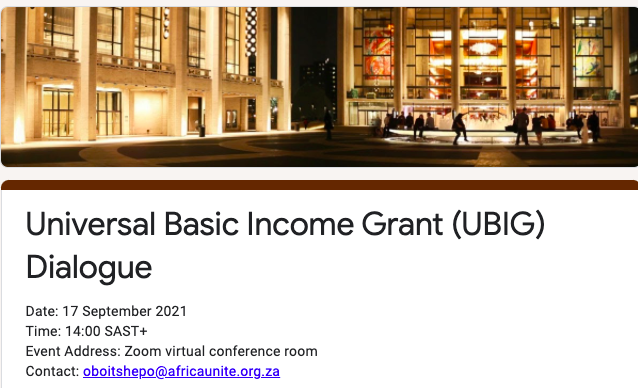BIG: A dialogue on the Universal Basic Income (UBI/BIG)


The Basic Income Grant (BIG) is not a silver-bullet solution for every problem to every problem in South Africa, but it is a multi-faceted solution. A BIG would impact many different sectors and reduce the burdens of inequalities in the country. As well as uplift the 13 million people in poverty out of starvation.
Some rumours on the BIG that need to be addressed are that it makes recipients lazy, and that the country cannot afford a BIG or that it creates dependency on the government. It doesn’t make people lazy, and we can afford it. The BIG isn’t some new radical idea, it has been done before. We’ve seen the pilot in Kenya, USA, Canada and many more countries in the world.
We at SPII have been working on research to showcase how a BIG can be funded and implemented, we can’t afford not to provide dignity of life back to our people. For more information on the proposed funding, click here
Regarding dependency, we are all dependent on the government one way or another. The grant enables entrepreneurs to sprout, selling goods with the grant money produces an income for them as well as economic growth and participation.
Grant recipients are dependent on the government, and so is everyone else who pays taxes and earns an income. Implementing a grant helps to lessen dependency, looking at Kenya’s pilot BIG program, more people became employable after receiving the basic income grants. This afforded them transport, enabling them to go to school and earn an education. Every act towards obtaining a job needs initial money, taking taxis, having a phone to receive calls and send out resumes.
This grant promotes participants in the economy, which ultimately increases our spending power. This rejuvenates townships, where unemployment is sky-high.Injecting money into townships causes businesses to thrive. As well as allowing our people to live a decent standard of living.
Women caregivers in Kenya were more likely to enter the workforce when receiving grants, it helped them go for a job interview, allowed them to pay someone to watch the kids while they worked. It empowered them to become dependent on themselves and less dependent on their parents or spouses.
R1335 is the proposed amount for the basic income grant, this is based on the upper bound poverty line released by StatsSA, every South African needs this amount to survive. If you received R1335 a month, you wouldn’t quit your job, nobody will be satisfied with that amount, they will work harder to make more. Yet, it is a lifeline for those without any other option.
How will it change youth unemployment?
People are starving and looking out for themselves, people in dire circumstances who don’t have access to basic needs, don’t act in pro-social ways, benefiting the people surrounding you.
South African youth grow up in dire circumstances, again looking at Kenya’s pilot. The crime rates have decreased, entry level jobs were produced and that reduces poverty-driven crime.
The multiplier effect is also a great motivation to implement the basic income grant, for every rand invested in a BIG, we generate 2.2% interest. Government spending money on a BIG ultimately boost the economy in return.
If care-workers were paid in dollars, black women would be amongst the richest people in the country.
Impoverished black women have the most to gain from the big, this will aid women with multiple dependents to provide for them. As well as an assured monthly income. South African women are starving to shield their families for starvation, according to the NIDSCRAM data, this is shocking, and we owe it to our women to supply for their dependents.
Gender-based Violence is mostly due to dependence, women are financially exploited or have to remain in abusive relationships because they can’t support themselves. Men are burdened, they have a whole family to take care of. Most of the time they are the sole providers for their families, this creates frustration and when they cannot support their families they lash out and express their “masculinity” through violence.
It’s not a question of can we afford a basic income grant, it’s a question of how can we not?